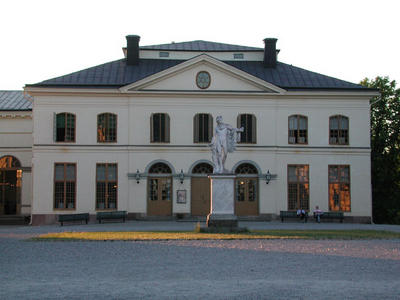Summer Opera: Rameau's Zoroastre in Drottningholm
 A few days ago, I wrote a post (Saving Drottningholm Court Theater, August 10) about the famous Baroque court theater at Drottningholm Palace, outside of Stockholm. Shortly thereafter, I came across an article (A Drottningholm, le baroque en son écrin, August 14) by Renaud Machart in Le Monde on the same subject (my translation):
A few days ago, I wrote a post (Saving Drottningholm Court Theater, August 10) about the famous Baroque court theater at Drottningholm Palace, outside of Stockholm. Shortly thereafter, I came across an article (A Drottningholm, le baroque en son écrin, August 14) by Renaud Machart in Le Monde on the same subject (my translation):
It has to be said: the façade of the legendary theater in Drottningholm ("the Queen's island"), located on the grounds of the Swedish royal family's palace, which it still occupies, is disappointing for those who are expecting to find a Rococo building. In fact, if you put the SNCF sign on the front, the building would almost look like a small town's railway station. [...]Machart was in Sweden to see the production of Rameau's Zoroastre conducted by Christophe Rousset from France (the last of this summer's three operas). In the article, he describes the tour of the backstage machinery that Rousset led him on. In the same day's issue of Le Monde, there was also Machart's review of Zoroastre (Luxure musicale et sobriété dramatique pour le "Zoroastre" de Rameau, August 14):
At the court of Gustave III (1746-1792), everyone spoke, read, and wrote French. The monarch, who had visited the Kingdom of France in 1771, also had a troupe of French actors in permanent residence, who performed Grand Siècle classics, as well as Beaumarchais. Many 18th-century operas were performed also, but never Rameau or Mozart. The king ended all relations with France at the Revolution (calling the new government "orangutans") but was himself assassinated in the theater, in 1792, by a plot of the nobles, furious at having seen their privileges eroded by his. This event inspired operas: Auber's Gustave III, ou Le Bal masqué (1833) and Verdi's Un Ballo in Maschera (1859) on the same libretto by Eugène Scribe. After the sovereign's death, the theater was left practically unused through the beginning of the 20th century, which explains the miraculous state in which it was found in 1921.
There are two unforgettable acoustic experiences for any music-loving festival-goer: that of the Bayreuth theater, constructed precisely for the operas of Richard Wagner, and that of the little Drottningholm royal theater, ideal for the operas of the 18th century. [...] The great Swedish singer Elisabeth Söderström, who was the theater's artistic director for several years, had it right when she said that this theater's sound has "the same magic as that of a Stradivarius."The same team of artists and musicians, led by Christophe Rousset, will reconvene next summer for a production of Rameau's wonderful mythological opera Castor et Pollux. Perhaps the Ionarts junket of European opera festivals next summer should include Drottningholm along with Savonlinna?
When, on Friday, August 12, the conductor Christophe Rousset launched his musicians into the almost raging overture of Zoroastre, an extraordinary opera by Jean-Philippe Rameau, not staged much, one felt oneself trapped in a beam of harmonious vibrations. The sound has presence, energy, grain. It was dry, but a muscled and not woody dryness, a fullness in this wooden background. The sonic force was decoupled when the singers came to the edge of the stage, where the sound is the most ideal. One's ears were filled: Rameau played like this is an orgy of sound.





















































No comments:
Post a Comment